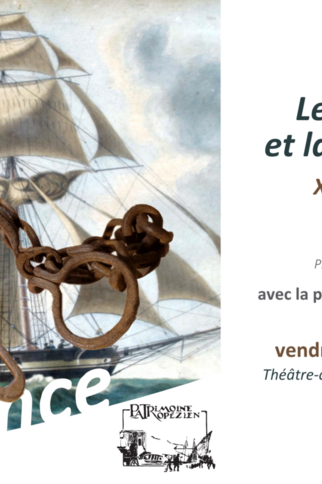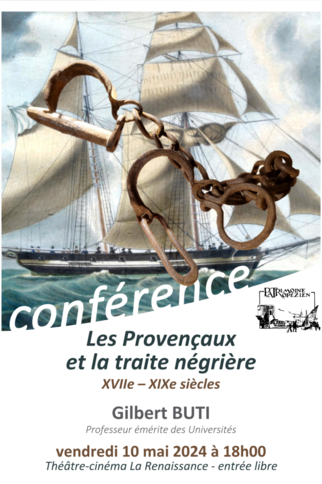Saint-Tropez
Friday 10 May 2024 from 18h to 20h
Historical lecture presented by Gilbert BUTI, Emeritus Professor of History at Marseille-Aix University.
Organised by the Patrimoine Tropézien association. When the issue of the slave trade is raised, people think of Nantes, Bordeaux and Liverpool. Marseille is rarely associated with this type of trade.
Despite the scattered, fragmentary and diverse documentation, the broad outlines are clear: with around 120 slave trade shipments in the 18th century, Marseille was a long way behind Nantes, which had over a thousand, but above all this trade accelerated suddenly and brutally in the middle of the century. Prior to this, the city of Marseille had only seen a few episodic shipments.
Why were there so few shipments? This was essentially due to an economic issue. The people of Marseilles were used to trading with the Middle East and Italy, where they recouped their investment after 6 months to a year, whereas with the slave trade, capital was tied up for 2 or 3 years or even longer.
However, there was a boom in the trade between 1783 and 1793, with nine ships a year compared with one every three years until then. Gilbert Buti attributes this acceleration in this "shameful trade" to the increase in state bonuses for each black person landed, but above all to "the drop in profits for traders in the Levant trade, the centuries-old mainstay of the port of Marseille, and the loss of momentum in the plantation economy in the West Indies. The slave trade was a way of compensating for this loss of earnings".
In the 19th century, despite successive abolitions, some sailors from Provence continued to trade illegally, including a few Tropéziens such as Captain Trullet or the unfortunately famous Captain Gimbert.
Organised by the Patrimoine Tropézien association. When the issue of the slave trade is raised, people think of Nantes, Bordeaux and Liverpool. Marseille is rarely associated with this type of trade.
Despite the scattered, fragmentary and diverse documentation, the broad outlines are clear: with around 120 slave trade shipments in the 18th century, Marseille was a long way behind Nantes, which had over a thousand, but above all this trade accelerated suddenly and brutally in the middle of the century. Prior to this, the city of Marseille had only seen a few episodic shipments.
Why were there so few shipments? This was essentially due to an economic issue. The people of Marseilles were used to trading with the Middle East and Italy, where they recouped their investment after 6 months to a year, whereas with the slave trade, capital was tied up for 2 or 3 years or even longer.
However, there was a boom in the trade between 1783 and 1793, with nine ships a year compared with one every three years until then. Gilbert Buti attributes this acceleration in this "shameful trade" to the increase in state bonuses for each black person landed, but above all to "the drop in profits for traders in the Levant trade, the centuries-old mainstay of the port of Marseille, and the loss of momentum in the plantation economy in the West Indies. The slave trade was a way of compensating for this loss of earnings".
In the 19th century, despite successive abolitions, some sailors from Provence continued to trade illegally, including a few Tropéziens such as Captain Trullet or the unfortunately famous Captain Gimbert.
Address
Théâtre Cinéma La Renaissance
13 Place Carnot
Place des Lices
83990 Saint-Tropez
Place des Lices
83990 Saint-Tropez
Opening
Friday 10 May 2024 between 6 pm and 8 pm.
-
May 2024
L M M J V S D -
June 2024
L M M J V S D -
July 2024
L M M J V S D -
August 2024
L M M J V S D -
September 2024
L M M J V S D -
October 2024
L M M J V S D -
November 2024
L M M J V S D -
December 2024
L M M J V S D -
January 2025
L M M J V S D -
February 2025
L M M J V S D -
March 2025
L M M J V S D -
April 2025
L M M J V S D -
May 2025
L M M J V S D




